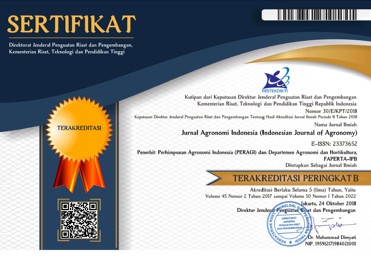Pemberian Mulsa dalam Budidaya Cabai Rawit di Lahan Kering: Dampaknya terhadap Hasil Tanaman dan Aliran Permukaan
Abstract
The problem of plant cultivation in dry upland with slope of >15° is the high soil erosion that result in high rate of sedimentation in the downstream of watershed. One way of overcoming this problem is by utilization of mulches. The objective of the experiment was to study the effect of mulch application on growth and yield of chilli (Capsicum frutescensL.).The experiment was conducted from January 2010 until June 2011 at Selopamioro micro watershed at Imogiri Subdistrict, BantulDistrict, Special Region of Yogyakarta. The experiment was arranged in a randomized complete block design consisted of four mulch treatments (rice straw, litter, plastic/silver black polyethylene, and without mulch) and four replications. The observed variables were the growth parameter (plant height), soil moisture content, soil temperature, and yield (number and
weight of chilli). The result showed that application of mulches did not affect plant height and yield of chilli, but increased number of fruit. The best mulch for chilli crops in upland area was rice straw, that yielded the highest increase in number of fruit. Mulch as a soil conservation practice reduced runoff coefficient, while dicharge and extended of the reponse time were reduced only at rainfall less than 21 mm.
Keywords: Capsicum frutescensL.,mulch, runoff, upland area
Published
2014-02-03
How to Cite
HeryaniN., KartiwaB., SugiartoY., & HandayaniT. (2014). Pemberian Mulsa dalam Budidaya Cabai Rawit di Lahan Kering: Dampaknya terhadap Hasil Tanaman dan Aliran Permukaan. Jurnal Agronomi Indonesia (Indonesian Journal of Agronomy), 41(2). https://doi.org/10.24831/jai.v41i2.7520
Section
Articles












